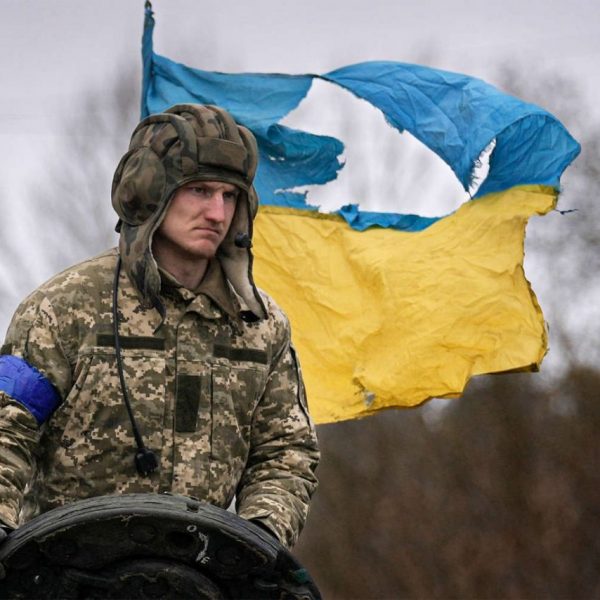
And there won't be any negotiations with Zelensky when the Ukrainian army collapses and a replacement government is installed
By Stephen BRYEN
The Ukraine war will end in a surrender, not in a negotiated deal. That is my sense of where the war is headed and why the parties cannot negotiate a settlement.
The latest wrinkle in the missing negotiating saga is a declaration in the form of an interview given by Ukrainian President Volodymyr Zelensky to the Philadelphia Inquirer.
In the interview, Zelensky said there can't be direct negotiations between Ukraine and Russia but there could be indirect negotiations through a third party. In Zelensky's proposed scenario, the third party will serve as an intermediary and any deal will only be with the intermediary, not between Russia or Ukraine. Zelensky suggested the UN could act in this role.
However, the Zelensky proposal is a non-starter for many reasons, but the biggest one is that warring states need to directly agree on ending a conflict.
There is no hope of a third party implementing any deal, as the failed Minsk agreements (2014, 2015) proved. Minsk was a hybrid case where the deal was signed by Russia, Ukraine and the Organization for Security and Cooperation in Europe (OSCE).
Ukraine refused to implement the deal and the OSCE proved toothless and unwilling to try and enforce the Minsk accords. The deal had political backing from Germany and France, although neither was a signatory nor legally obliged in any manner to support the resulting deal.
Zelensky's "proposal" really is just another smokescreen to deflect criticism of Ukraine for not wanting a settlement with Russia. Three strong forces are keeping Zelensky from the negotiating table.
The most important is that the main Anglo-Saxon players in NATO, namely the US and the UK, strongly oppose any negotiations with Russia. The US has done everything it can, including through sanctions and diplomatic measures, to prevent any dialogue with Russia on any subject (other than prisoner exchanges).
The second reason is Ukrainian legislation, sponsored by Zelensky, prohibiting negotiations with Russia. The Verkhovna Rada (Ukraine's parliament) could rescind that legislation in a nanosecond if Zelensky asked them to do so but he likely won't.
Zelensky completely controls the Ukrainian parliament, has arrested or exiled opposition politicians, and controls the press and other media. Zelensky's iron fist means that he won't personally allow direct negotiations.
Zelensky also has signed a decree prohibiting any negotiations with Russia's president, Vladimir Putin.
The third reason relates to pressure on Zelensky from hard-right nationalists, including especially the neo-Nazi Azov brigade. Direct evidence for this is the firing of Lieutenant General Yuri Sodol, the top commander of Kiev's forces in the Kharkov area.
Sodol was accused by Azov brigade leaders of killing more Ukrainians than the Russians in the Kharkov battles. Azov took their message to the Rada and Zelensky obliged them by firing Sodol.
Since Sodol's dismissal, Ukraine's situation has worsened along the entire line of contact. Ukrainian battle losses are very high, with as many as 2,000 killed and wounded on some days.
The Russians have stepped up their attacks with FAB glide bombs, including the monster FAB-3000which just hit a Ukrainian army command center in the Donbas town of New York and reportedly killed 60 or more Ukrainian military personnel.
The Russians say that Zelensky is not a viable negotiating partner because his term of office expired in May. There is some confusion about the legal situation in Ukraine but experts in and outside Ukraine think that the leadership of the country should pass to the Speaker of the Rada since Zelensky completed his term.
Ruslan Stefanchuk is the Rada speaker and is becoming more politically active, though he has not opposed Zelensky's continued rule.
Meanwhile, given the battlefield situation, the Russians no doubt figure that the time will soon come when the Ukrainian army either collapses or surrenders, or both.
In either case, the Ukrainian government will need to be replaced in some manner, perhaps with an interim military leadership selected by Russia. That would allow the Russians to formulate a capitulation agreement with a replacement government.
A surrender by Ukraine's army and an agreement with a Russia-appointed government would make NATO's continued involvement in Ukraine impossible.
That could open the door, finally, to a security dialogue between NATO and Russia once NATO digests what happened and why. Unfortunately, loading NATO with has-been political leaders like Marc Rutte does not bode well for the future of the alliance.
The key message for NATO if the Russians win in Ukraine, as seems more and more likely, is that the security alliance must stop its expansion and look for a more stable arrangement with Russia in Europe.
Stephen Bryen is senior correspondent at Asia Times. He served as staff director of the Near East Subcommittee of the US Senate Foreign Relations Committee and as a deputy undersecretary of defense for policy.
Original article: Weapons and Strategy Substack via Asia Times